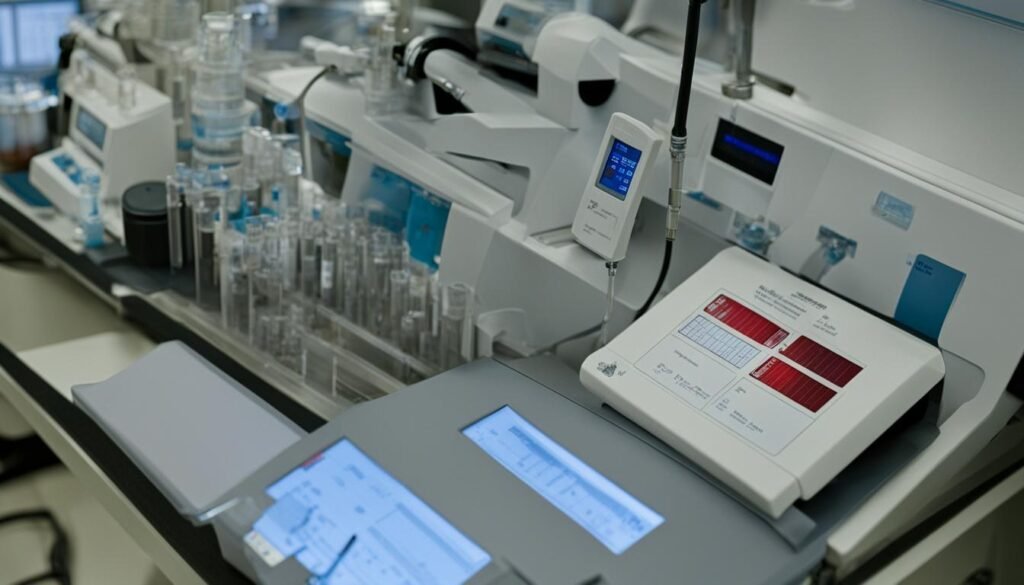Kidney diseases and their prevention are crucial for maintaining optimal kidney health. To ensure that your kidneys remain healthy and reduce the risk of diseases, it is essential to follow certain recommendations. In this section, we will explore some important tips and expert advice on kidney disease prevention.
Key Takeaways
- Preventing kidney diseases is crucial for optimal kidney health.
- Follow the recommendations for kidney disease prevention to reduce the risk of developing kidney diseases.
- Maintain a healthy diet and regular exercise to support kidney health.
- Early detection through regular check-ups and kidney function tests is essential for effective treatment and management.
- Avoid harmful substances, manage stress and control blood pressure and diabetes to reduce the risk of kidney diseases.
Understanding Kidney Diseases
To prevent kidney diseases effectively, it’s important to understand what they are and their impact on overall health. Kidney diseases refer to a group of conditions that affect the kidneys’ ability to function correctly.
According to the National Kidney Foundation, around 37 million Americans have kidney diseases, and many are unaware of it. The two most common types of kidney diseases are chronic kidney disease (CKD) and kidney stones. CKD is a long-term condition in which the kidneys’ ability to filter blood decreases gradually. Kidney stones are hard mineral and salt deposits that form in the kidneys or urinary tract and can cause severe pain.
Other common types of kidney diseases include glomerulonephritis, a kidney disease that affects the kidneys’ filtering units, and polycystic kidney disease, a genetic condition that causes cysts to develop in the kidneys.
It’s essential to recognize the early signs of kidney diseases to prevent complications. These signs include fatigue, swelling in the legs and feet, loss of appetite, and changes in urine output.
Common Kidney Diseases
Here’s a brief overview of some common kidney diseases:
| Kidney Disease | Description |
|---|---|
| Chronic Kidney Disease (CKD) | A long-term condition in which the kidneys’ ability to filter blood decreases gradually |
| Kidney Stones | Hard mineral and salt deposits that form in the kidneys or urinary tract and can cause severe pain |
| Glomerulonephritis | A kidney disease that affects the kidneys’ filtering units |
| Polycystic Kidney Disease (PKD) | A genetic condition that causes cysts to develop in the kidneys |
Knowing the common types of kidney diseases can help you take proactive measures to prevent their onset. In the following sections, we will explore risk factors for kidney diseases and highlight essential tips for maintaining optimal kidney health.
Risk Factors for Kidney Diseases
While kidney diseases can affect anyone, certain factors can increase the likelihood of developing the condition. Understanding the key risk factors is essential in mitigating these risks and maintaining optimal kidney health. Some of the most common factors that contribute to kidney diseases include:
| Factor | Details |
|---|---|
| High Blood Pressure | Long-term high blood pressure can damage the blood vessels in the kidneys, reducing their functionality and increasing the risk of kidney diseases. |
| Diabetes | Diabetes is one of the leading causes of kidney diseases, as high blood sugar levels can significantly damage the kidneys over time. |
| Obesity | Obesity can put extra pressure on the kidneys, leading to complications, such as chronic kidney disease. |
| Smoking | Smoking can damage blood vessels, reducing blood flow to the kidneys. This reduces their functionality and increases the risk of kidney diseases. |
| Poor Nutrition | A diet that is high in salt, sugar, and fat can increase the likelihood of developing high blood pressure, diabetes, and obesity, all of which are risk factors for kidney diseases. |
It’s important to note that some kidney diseases may be hereditary, meaning that they are passed down through families. Being aware of the risk factors and adopting a healthy lifestyle can help reduce the risk of developing kidney diseases, even if they run in your family.
Importance of Early Detection
Detecting kidney diseases at an early stage is crucial for effective treatment and management. Early diagnosis helps prevent further deterioration, ultimately improving the prognosis of the disease. The benefits of early detection of kidney diseases are numerous, including:
- Better treatment outcomes
- Reduced risk of kidney failure
- Early intervention to slow or halt disease progression
- Prevention of complications associated with kidney disease
To ensure early detection, it is essential to undergo regular kidney function tests. These tests can detect subtle changes in kidney function and indicate the presence of kidney diseases before symptoms develop. If you are at risk of kidney diseases or have a family history of the disease, regular kidney function tests are even more critical to ensure early detection and timely treatment.
“Early diagnosis and prompt treatment are vital when it comes to kidney diseases. They can make a significant difference in slowing down the progression of the disease and preserving kidney function.”
Maintaining a Healthy Diet
When it comes to preventing kidney diseases, maintaining a healthy diet is key. Eating a kidney-friendly diet that is low in sodium, phosphorus, and potassium can greatly reduce the risk of kidney damage.
A kidney-friendly diet consists of:
- Fruits and vegetables: These are excellent sources of vitamins and minerals without being high in sodium or potassium. Examples include apples, berries, cauliflower, and green beans.
- Lean proteins: Proteins are essential for building and repairing tissue, but it’s important to choose lean options such as skinless chicken, fish, and turkey to avoid consuming excess phosphorus.
- Whole grains: Whole grain products like brown rice, whole wheat bread, and pasta provide fiber, vitamins, and minerals without being high in potassium.
- Low-fat dairy products: Dairy products like milk, cheese, and yogurt are high in calcium and low in phosphorus and potassium, making them an excellent source of nutrition for those with kidney disease.
On the other hand, there are certain foods that should be avoided to maintain optimal kidney health:
- Processed foods: Processed foods like pre-packaged meals, fast food, and snacks are often high in sodium, which can increase blood pressure and damage the kidneys over time.
- Sugary drinks: Beverages like soda and energy drinks contain high amounts of sugar, which can contribute to weight gain and high blood sugar levels, both of which increase the risk of kidney disease.
- Foods high in phosphorus: Consuming excess phosphorus can contribute to kidney failure. Foods high in phosphorus include dairy products, nuts, and whole grains such as bran and oatmeal.
- Foods high in potassium: While potassium is an important nutrient, those with kidney disease should limit their intake because the kidneys may not be able to filter excess potassium. Foods high in potassium include bananas, potatoes, and spinach.
Hydration and Kidney Health
Proper hydration plays a critical role in maintaining optimal kidney health. The kidneys are responsible for filtering waste and excess fluids from the blood, and without sufficient hydration, they can become overworked and damaged. Therefore, it’s essential to drink enough water throughout the day to support your kidneys and promote healthy kidney function.
But how much water is enough? While the amount can vary depending on factors such as age, weight, activity level, and climate, a general guideline is to drink at least eight 8-ounce glasses of water per day. Additionally, drinking other fluids like tea, coffee, and juice can also contribute to your overall fluid intake.
It’s important to note, however, that excessive water intake can also be harmful to the kidneys and other organs. If you are unsure how much water you should be drinking, consult with your healthcare provider for personalized recommendations.
In addition to drinking enough fluids, incorporating foods with high water content like cucumber, watermelon, and soup can also contribute to your daily hydration needs. By staying properly hydrated, you can support your kidneys’ function and prevent the development of kidney diseases.
Regular Exercise and Kidney Health
Regular physical activity is crucial for maintaining optimal kidney health. Exercise helps to improve blood flow and strengthen the cardiovascular system, reducing the risk of kidney diseases. Moreover, engaging in physical activity can help to manage weight, blood pressure, and blood sugar levels, which are all important factors in kidney function.
“Physical activity is essential for a healthy life. It has been shown to have positive effects on the prevention and treatment of many chronic diseases, including kidney diseases.”
According to the National Kidney Foundation, adults should aim for at least 150 minutes of moderate-intensity exercise or 75 minutes of vigorous activity per week. Suitable physical activities include brisk walking, cycling, swimming, and dancing. It is important to consult with a healthcare professional before starting any new exercise regimen.
The Benefits of Physical Activity for Kidney Health
Regular exercise provides numerous benefits for overall health, including kidney health. Some of these benefits include:
- Improving blood flow
- Reducing inflammation
- Lowering blood pressure and cholesterol levels
- Reducing the risk of obesity and diabetes
- Enhancing overall well-being
A sedentary lifestyle can have adverse effects on kidney function, so it is crucial to incorporate regular physical activity into your daily routine. Whether it’s taking the stairs instead of the elevator or going for a daily walk, every little bit helps.
Managing Blood Pressure and Diabetes

Controlling blood pressure and managing diabetes are essential for preventing kidney diseases. Chronic high blood pressure can damage the kidneys and increase the risk of kidney disease. Similarly, diabetes can cause damage to the blood vessels in the kidneys, leading to kidney disease.
Effective strategies for managing blood pressure include:
- Maintaining a healthy weight
- Reducing salt intake
- Incorporating physical activity into your daily routine
- Taking medication as prescribed by your doctor
Note that these strategies may vary depending on individual health needs, so it’s essential to consult with your doctor to find the best course of action for you.
For those with diabetes, maintaining healthy blood sugar levels is crucial for preventing kidney diseases. This can be accomplished through:
- Eating a balanced, low-sugar diet
- Monitoring blood sugar levels regularly
- Taking medication as prescribed by your doctor
- Incorporating physical activity into your daily routine
Regular check-ups with your doctor are also vital for proper management of blood pressure and diabetes. These routine visits can help detect and address any potential issues before they develop into more serious problems.
Common Medications for Blood Pressure and Diabetes
| Medication | Purpose | Common Side Effects |
|---|---|---|
| ACE inhibitors | Lower blood pressure and protect kidneys | Cough, dizziness, headache |
| ARBs | Lower blood pressure and protect kidneys | Dizziness, headache, stomach pain |
| Beta-blockers | Lower blood pressure and reduce heart rate | Fatigue, dizziness, depression |
| Diuretics | Reduce excess fluid in the body and lower blood pressure | Frequent urination, dehydration, electrolyte imbalances |
| Insulin | Regulate blood sugar levels in diabetes | Low blood sugar (hypoglycemia), weight gain, injection site reactions |
| Metformin | Regulate blood sugar levels in diabetes and reduce risk of cardiovascular disease | Nausea, diarrhea, stomach upset |
Consult with your doctor to determine if medication is necessary for managing blood pressure and/or diabetes.
Avoiding Harmful Substances
Smoking and substance abuse can cause significant harm to the kidneys, leading to various kidney diseases. Smoking damages the blood vessels, decreasing blood flow to the kidneys, and can worsen kidney disease in those who already have it. Substance abuse, including the use of drugs and excessive alcohol consumption, puts immense pressure on the kidneys, causing damage over time.
It is vital to avoid smoking and drug abuse, as well as reduce alcohol consumption to maintain healthy kidney function. Quitting smoking can improve kidney function and decrease the risk of kidney diseases. If you struggle with substance abuse, seek help and support from healthcare professionals to overcome addiction and protect your kidneys.
Smoking and substance abuse can cause damage to the kidneys and increase the risk of kidney diseases. Quitting smoking and seeking help for addiction can protect kidney function.
Regular Check-ups and Kidney Function Tests

Regular check-ups and kidney function tests are integral in monitoring kidney health. Kidney diseases can often go unnoticed and show no symptoms until they reach advanced stages, making it crucial to undergo routine check-ups. These tests can identify any potential issues early on before they develop into a serious condition. It is recommended to schedule check-ups with a doctor at least once a year to ensure early detection and appropriate management of kidney health.
The two common tests for detecting kidney function are the blood and urine tests. Blood tests check the glomerular filtration rate (GFR), which measures how effectively the kidneys filter waste from the blood. Urine tests check for the presence of protein in the urine, which is a sign of kidney damage. If caught early, kidney disease can be managed through lifestyle changes and medication.
Amy, a 45-year-old mother, discovered that she had high blood pressure during her annual check-up. Her doctor recommended kidney function tests as a precautionary measure to monitor her kidney health status. The tests showed that Amy’s kidneys were functioning normally and had not been affected by her high blood pressure. Thanks to regular check-ups, Amy is now aware of her kidney health status and can take proactive measures to prevent any potential issues in the future.
Regular check-ups and kidney function tests are simple and effective ways to monitor your kidney health, and can ultimately prevent the progression of kidney disease. Make it a priority to schedule regular check-ups with your doctor and stay informed about your kidney health status.
Stress Management and Kidney Health
Chronic stress can have a significant impact on kidney health, making it critical to manage stress levels effectively. The body’s natural response to stress includes an increase in heart rate and blood pressure, which, over time, can lead to damage to the kidneys’ blood vessels. Additionally, stress can lead to unhealthy behaviors such as overeating or smoking, which further contribute to kidney disease development.
There are various stress management techniques that can assist in reducing stress levels, such as:
- Deep breathing exercises
- Meditation and mindfulness practices
- Regular physical activity
- Getting sufficient sleep
Implementing these stress management techniques can help reduce the impact of stress on the kidneys, promoting better overall kidney health.
Finding the Right Stress Management Techniques for You
Not all stress management techniques work for everyone. It is essential to find the right approach that works for you and stick to it consistently. Consider trying various techniques, including hobbies and activities that bring joy, seeking professional counseling or therapy, and practicing gratitude and positive self-talk.
Remember, implementing stress management techniques is crucial not only for kidney health but for overall well-being. Small changes in daily habits and routines can go a long way in reducing stress and promoting a healthier lifestyle.
Conclusion
Preventing kidney diseases is crucial for maintaining optimal kidney health and overall well-being. By understanding kidney diseases, identifying the risk factors, and taking proactive measures such as maintaining a healthy diet, staying hydrated, exercising regularly, managing blood pressure and diabetes, avoiding harmful substances, and undergoing regular check-ups and kidney function tests, you can significantly reduce the likelihood of developing kidney diseases.
Remember that prevention is key, and prioritizing kidney health should be a part of your daily routine. By following the tips and advice outlined in this article, you can take control of your kidney health and live a healthier, more fulfilling life. So start implementing these strategies today and give your kidneys the care and attention they deserve!
FAQ
What are some essential tips for preventing kidney diseases?
Maintaining a healthy diet, staying hydrated, exercising regularly, managing blood pressure and diabetes, avoiding harmful substances, and getting regular check-ups are some essential tips for preventing kidney diseases.
What is the significance of early detection in kidney diseases?
Early detection of kidney diseases is crucial for effective treatment and management. It helps prevent further damage, improves outcomes, and increases the chances of successful intervention.
What is a kidney-friendly diet?
A kidney-friendly diet includes consuming adequate amounts of fruits, vegetables, whole grains, lean proteins, and healthy fats. It also involves limiting the intake of sodium, phosphorus, and potassium.
How does hydration affect kidney health?
Staying properly hydrated is essential for maintaining optimal kidney health. It helps the kidneys filter waste products and toxins, supports proper kidney function, and reduces the risk of kidney stone formation.
Can exercise help improve kidney health?
Yes, regular exercise has a positive impact on kidney health. It improves cardiovascular health, helps control blood pressure, reduces the risk of chronic conditions like diabetes, and enhances overall kidney function.
How does managing blood pressure and diabetes help prevent kidney diseases?
High blood pressure and diabetes are major risk factors for kidney diseases. By effectively managing and controlling these conditions, you can reduce the strain on the kidneys and minimize the risk of kidney disease development.
What substances should be avoided for optimal kidney health?
Smoking and substance abuse, such as illicit drugs and excessive alcohol consumption, should be avoided for optimal kidney health. These substances can severely damage the kidneys and impair their function.
How often should regular check-ups and kidney function tests be conducted?
Regular check-ups and kidney function tests should be conducted as recommended by your healthcare provider. It is important to follow their guidance in terms of frequency and schedule for these tests.
What is the impact of stress on kidney health?
Chronic stress can have adverse effects on kidney health. It can contribute to the development of kidney diseases and worsen existing conditions. Managing stress through relaxation techniques and self-care is essential for maintaining optimal kidney health.




